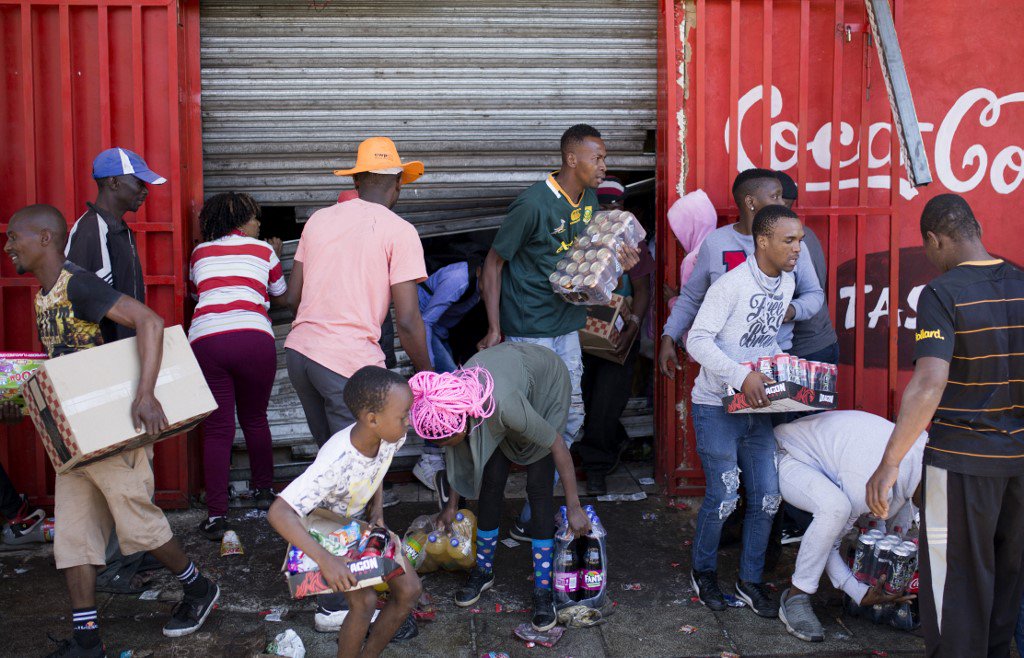
In South Africa, it is looting a la carte; or vandals table d’hôte — a complete family gang comprising the father, the mother and the child(ren), all beatific in their plunder of foreign shops!
Dramatic? Yes, for no one could swear the looting kids were children of the nearest looting adults.
But no: it isn’t to further tar the rampaging xenophobes of Oliver Thambo’s country — more of Afro-phobes, South Africa insists — busy claiming foreign scalps, though under searing international scorn.
Still, the defining, if troubling pictures, from the plunder and arson, are exactly that: men, women and children in an orgy of looting, just to sate patriotic ire — and rumbling tummies — against “criminal” foreigners.
Now, after the hurly burly is done, and the battle is lost and won, how do you convince that child, tender veteran of patriotic looting, that looting and arson are evil — long after the hated foreigners had fled, and the shops remaining are the natives’?
Xeno (foreigner) and phobe (irrational hate or fear) are Greek words. Sparta was the classical xenophobic enclave — all antiquity rumbled with its aversion for non-Spartans, even among the Greeks.
Yes, Sparta built a fierce military machine, that knocked its contemporaries cold. Still, beyond military hegemony, Sparta never achieved the all-round greatness that made rival Athens tick, as the greatest of the Greek city states. That was because Greece opened its door to all — not unlike pre-Donald Trump’s United States.
The simple moral? A xenophobic country soon shrivels up. Even if it thrives, it seldom achieves its full greatness, with no input from aliens. The contemporary apogee of that is again the United States. Still, no one is sure of the future, with the present Trumpian hurricane.
Shrivelling and wilting, therefore, are what South Africa risks, should it continue on its present Afro-phobic ruin.
Part of it is physical — with a suspect workforce across the board, and a populace bred on an entitlement syndrome (hardly a crime, given how apartheid had crushed the Black South African psyche for decades on end), South Africa faces a danger of implosion.
Besides, if xenophobia succeeds in driving away most aliens, it could deny native South Africans the chance to compete against foreigners, re-discover themselves as no laggards, as the White minority elite had conditioned their minds; hone their skills and, on equal footing, fight for fairer re-distribution of South Africa’s wealth — the crux of the present distemper.
But Afro-phobia could also lead to severe spiritual backlash.
Zimbabwe were White minority rule co-victims. Tanzania and Zambia (former Northern Rhodesia when Zimbabwe was southern Rhodesia) were key frontline states that helped to free Zimbabwe and South Africa from White minority rule and apartheid. Far-away Nigeria was dubbed honorary frontline state, for its radical anti-apartheid activism.
It is tragic, therefore, that those who stood by South Africa, in its greatest hour of need — Nigeria, Tanzania and Zambia (apart from Zimbabwe), have become the most bloodied from South Africans’ Afro-phobia!
That is crass ingratitude — the hottest part of hell, in the African moral cosmos.
What immediate irony! Apartheid South Africa was a pariah for cruelty towards its Black folk.
But independent South Africa, given the spate of sports boycotts (both Zambia and replacement, Madagascar, shunned the FIFA open window friendly with Bafana Bafana), coupled with the present Nigerian growl and Rwandan frown, is on its way to becoming a new pariah — for xenophobic cruelty, against fellow African countries, that fought hardest for its liberation!
Karma already setting in? Not so fast!
But the xenophobes of Mandela country had better watch it — xenophobes of Mandela country! Isn’t that a violent contradiction in terms, given the near-perfect universal icon the late Madiba was?
Still, xenophilia (love for foreigners) is no excuse for natives to allow aliens turn their country into a hopeless drug cartel. On this, some Nigerians in South Africa stand strongly charged — and condemned.
Nevertheless, this South Africa-Nigeria debacle is home to yet more ironies.
South African Catholic bishops, pouring ice-cold water on the government’s claim that the looting and arson were more of free-wheeling criminality than organized xenophobia, asked a rather pointed question: “If it was about drugs, why are South African drug dealers not being targeted as well?”
Doesn’t that ring true of local developments in Nigeria here?
Didn’t the media, at the height of the South West crisis of kidnapping and sundry criminality, rail and thunder at “Fulani herdsmen”, suggesting all Yoruba criminals had surrendered the crime franchise to the Fulani invaders?
Didn’t the Fulani find themselves victims of that horrendous profiling, simply because of past insensitivity to local feeling, when power and spoils of power were at stake?
And don’t some misguided Igbo continue to growl “Lagos is no man’s land”, the feeling of the Lagos natives be damned?
What do you call all of these — internal xenophobia?
If Nigerians could be this insensitive to themselves, can’t the same Nigerians, cocky, loud and proud, export that notoriety to their foreign hosts?
If you add crime, committed with such chutzpah, aren’t their hosts likely to flip, as the South Africans have done?
This is bitter home truth; but those with patriotic claptrap can exercise their right to carp!
No doubt: criminal Nigerians in South Africa stand fairly accused, though past notoriety could have led to the locals tracing far more crimes to them than they could have committed.
For instance, in a video that went viral on social media, two South Africans swore the killing of a local taxi driver, that fuelled this latest crisis, was by a Tanzanian drug baron, in an area in Pretoria, where Tanzanian crime reigned supreme.
Still, whatever the guilt of these Nigerians and other foreign African nationals, mob rule is not the solution. That is where the South African authorities have dismally failed.
The Lagos reprisals have shown looting, under the pretext of holy anger, is no South African monopoly. In reprisals, Nigerians too have attacked MTN shops and looted Shoprite malls.
But the difference is the Nigerian authorities have not looked the other way, and have moved to secure these businesses, even if not a few feel they ought to have been more proactive.
South Africa should have brought its foreign criminals to heel under its criminal-justice system, instead of seething with base rage (as Bongani Mkongi, South Africa’s deputy police minister, has betrayed), and given tacit support to their base elements to give their country a bad name, among the global community.
So, beyond patriotic ire and nationalist thunder, Nigeria and South Africa must engage each other to address this common plague. In a globalized world, no country can go it alone.
In any case, Nigeria and South Africa are too vital for the African regional economy to drift apart because of some mutual dregs, which the law, and its strictures, can take out.
You may be interested

Arsenal Equal Chelsea’s London Derby Feat After 5-1 Win Vs Palace
Webby - December 21, 2024Arsenal equaled Chelsea’s London derby achievement following their 5-1 win against Crystal Palace in Saturday’s Premier League game at Selhurst…

Haaland Backs Guardiola To Turn Man City’s Poor Form Around
Webby - December 21, 2024Erling Haaland had said he and his Manchester City teammates are still backing manager Pep Guardiola to turn the team’s…

PSG To Reignite Interest In Osimhen
Webby - December 21, 2024Paris Saint-Germain have contacted Napoli to discuss signing Victor Osimhen in January, according to reports in France.It is reported that…


















![American Pastor, David Wilson Seen Eating The Box Of Woman Who Isn’t His Wife [Video]](https://onlinenigeria.com/wp-content/uploads/2019/10/american-pastor-david-wilson-seen-eating-the-box-of-woman-who-isnt-his-wife-video-150x150.jpg)









